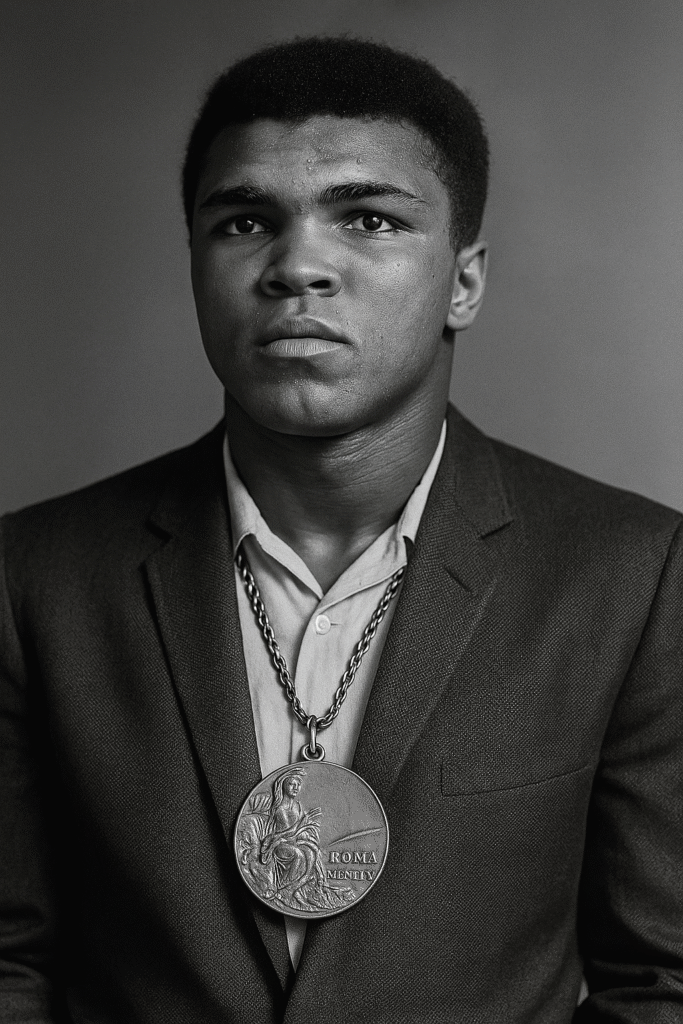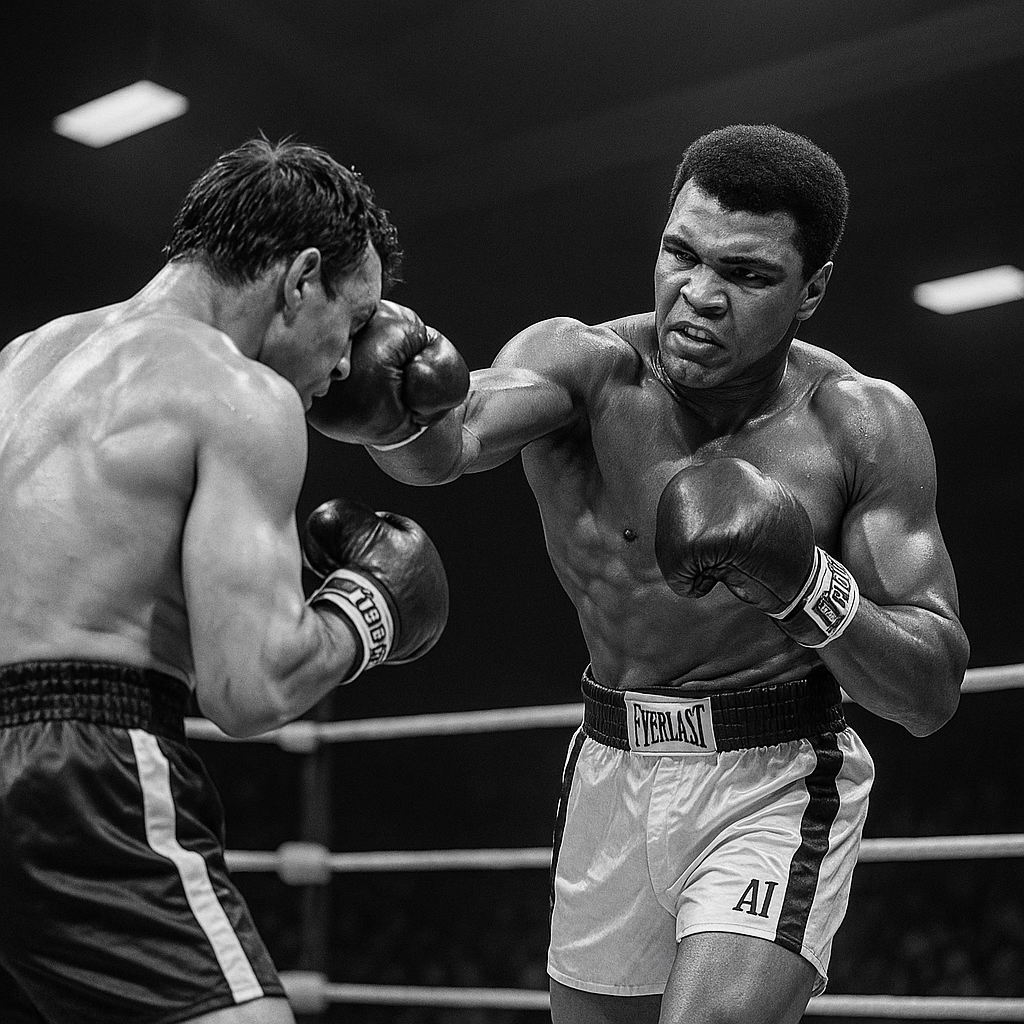Muhammad Ali is widely regarded as one of the greatest heavyweight champions in boxing historybritannica.com. He won a gold medal in light-heavyweight boxing at the 1960 Rome Olympics before turning professional shortly afterwardbritannica.com. In 1964 Ali (then known as Cassius Clay) stunned the world by knocking out Sonny Liston to become the world heavyweight boxing champion for the first timeapnews.combritannica.com. Over his career he fought 61 professional matches and compiled an outstanding record of 56 wins and 5 losses, with 37 of those wins by knockoutapnews.combritannica.com. He defended his heavyweight title against top contenders throughout the 1960s and 1970s, including famous bouts like the “Thrilla in Manila” against Joe Frazier and the “Rumble in the Jungle” against George Foremanapnews.combritannica.com. Remarkably, Ali became the first boxer ever to win the heavyweight world title three separate timesapnews.combritannica.com.

- Major Titles: Olympic gold (1960) and three-time world heavyweight championbritannica.comapnews.com.
- Record: Total 61 fights, 56 wins (37 by knockout) and only 5 lossesapnews.combritannica.com.
- Famous Fights: Beat Sonny Liston (1964), Joe Frazier (1974–75) and George Foreman (1974) to win or regain world titlesapnews.comapnews.com.
Ali’s speed, footwork and powerful punching (often described as “float like a butterfly, sting like a bee”) made him a boxing legend. He was known for his brash confidence and lyrical trash-talk, famously declaring “I am the greatest.” Being a champion in boxing means he was recognized as the very best in the sport’s heaviest weight class. In classrooms or articles for kids, one might include a photo of Ali raising his arms in victory, or a timeline graphic of his championship fights to illustrate this section.
Cultural and Political Activism
Outside the ring, Muhammad Ali became a prominent civil rights activist and social figure. In 1964, after winning his first title, he announced he was a member of the Nation of Islam (a Black Muslim organization) and rejected his birth name as a “slave name”apnews.com. This bold choice symbolized his pride in African American identity during the 1960s civil rights era. Ali spoke openly about racial injustice and supported the Black Power movement. For example, during the height of the Vietnam War he famously declared “I ain’t got no quarrel with those Viet Cong” and refused to be drafted into the U.S. militaryhistory.com. This conscientious objection was based on his religious and moral beliefs. Because of his refusal to serve, boxing authorities stripped him of his titles and banned him from the ring for about three yearshistory.comarchives.gov.
- Name Change (1964): Changed from Cassius Clay to Muhammad Ali to honor Islam and African heritageapnews.com.
- Vietnam War Protest (1967): Refused the U.S. military draft, opposing the Vietnam War on ethical groundshistory.com.
- Civil Rights Work: Traveled and spoke globally for racial justice and peace during his boxing banarchives.gov.
(For context: In the 1960s the United States was involved in a long war in Vietnam. The U.S. government sometimes required young men to serve in the military (the “draft”). Ali refused this because he believed the war was unjust, especially for African Americans. For readers outside the U.S., this was a major political issue of the time.)
Ali’s activism made him a symbol of conscience for many. During his suspension from boxing (1967–1970), he gave speeches around the world about civil rights and peacearchives.gov. He used his fame to speak up for the underprivileged and became a role model beyond sports. In a sense, Ali was one of the first sports heroes to use his platform to comment on politics and society.
Personal Struggles and Comebacks
Ali faced many personal challenges but showed remarkable resilience. After refusing the draft in 1967, he was convicted of draft evasion (a crime at the time), sentenced to prison, and received a $10,000 finehistory.com. His boxing titles were taken away, and he could not fight professionally for nearly three years. During this period Ali’s career seemed ruined, but he remained defiant. He trained in private and continued to speak publicly. On October 26, 1970 he finally returned to the ring, defeating Jerry Quarry in a comeback fighthistory.com. In March 1971 he lost a 15-round “Fight of the Century” to Joe Frazier, the first loss of his careerhistory.com. Many fans thought his career was over. Instead, Ali bounced back: in 1974 he defeated both Frazier (in a rematch) and then George Foreman to regain the heavyweight championshipbritannica.comhistory.com. Ali became the first boxer to regain the title twicebritannica.com, proving his earlier exile was only a pause.
After 1974 he continued fighting into the late 1970s. He lost the title to Leon Spinks in 1978 but won it back later that year, a third world title winbritannica.com. In 1979 he retired from boxing with a record of 56–5britannica.com. He tried two more comebacks (1980–81) but suffered defeats to Larry Holmes and Trevor Berbick and decided to retire permanently.
In his later life, Ali struggled with Parkinson’s disease, a degenerative brain condition. He was diagnosed in the early 1980s. Parkinson’s causes tremors, slurred speech and slow movement, and Ali said it was “my toughest fight”britannica.com. Despite these health problems, he remained active in public life for decades. Ali traveled to support charity events, raised millions for causes, and even lit the Olympic flame at the 1996 Atlanta Games. His determination to face the disease made him an inspiration; he often smiled and spoke to fans, even when speaking was difficult.
Enduring Legacy
Muhammad Ali’s legacy is felt worldwide both for his boxing skill and his humanitarian impact. He is often called “the Greatest” – a nickname he used for himself and one that others use to describe himapnews.com. Boxing experts and fans consistently rank him among the very best athletes everarchives.gov. Beyond sports, many remember him as a champion of justice and courage. Promoter Bob Arum said, “He was the greatest fighter of all time, but his boxing career is secondary to his contribution to the world,” reflecting Ali’s larger influenceapnews.com. Even former rival George Foreman praised him as “the greatest human being I ever met”apnews.com.

Over the years Ali received numerous honors. In 2005 he was awarded the U.S. Presidential Medal of Freedom (the nation’s highest civilian honor) by President George W. Bushespn.com. He was inducted into boxing and sports halls of fame, and countless awards and monuments commemorate him around the world. Schools, parks and charities have been named after him, and his childhood home in Louisville is now a museum. His famous quotes – such as “I am the greatest” – continue to be shared.
In recognition of his lasting impact, public ceremonies and memorials celebrated Ali’s life. This image shows Ali embracing President Bush at the 2005 Medal of Freedom ceremony. His dignified, determined spirit at that event – despite the effects of Parkinson’s disease – reminded many people of his strength. Today Ali is remembered not just as a boxing legend, but as a symbol of speaking up for one’s beliefs and inspiring others. Visual aids like a photo gallery of Ali’s famous fights, timelines of his championship years, or highlighted quotations from his speeches can help new generations connect with his story.
Ali’s story has been shared in books, films and on the internet, ensuring that people worldwide know who he was. He showed that an athlete can be more than a sports star – Ali helped shape discussions about race, religion and courage. As one modern reporter put it, “Few would disagree” that Ali was “the greatest” – and that he changed the world both inside and outside the ringapnews.com.
Read about History of Sports
Sources: Reputable accounts and records of Ali’s life and career were used, including news reports and historical summariesapnews.comhistory.comapnews.comarchives.gov that document his achievements, activism, and legacy.
